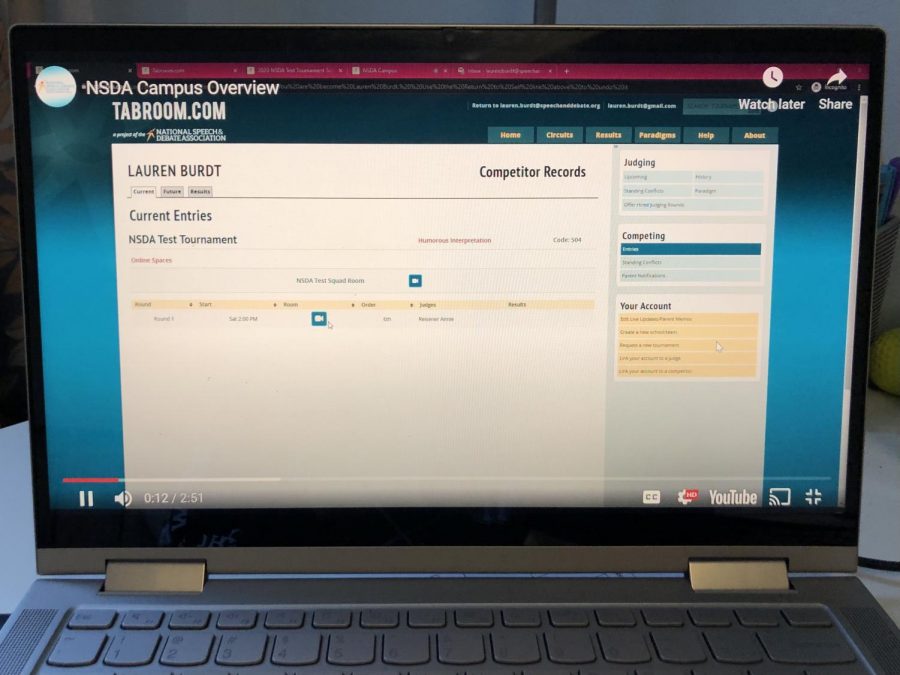Speech and Debate Goes Virtual
The NSDA’s online campus platform allows students to compete virtually, and it has many functions such as squad rooms. “The experience is definitely different, but we always make sure to check up on and support each other regardless of whether we’re debating virtually or in-person,” said Andrew Morrissey ’23.
Due to the COVID-19 pandemic, Speech and Debate tournaments at Bronx Science and around the country are being held virtually on the National Speech and Debate Association Campus’ online platform.
Since its founding in 1969, Bronx Science’s Speech and Debate team has consistently been considered as one of the strongest in the country. The team is currently the reigning New York State champion and has held the title for the past three years. They have also been ranked among the top five speech and debate teams in the country by the National Speech and Debate Association (NSDA).
Like all other extracurriculars this year, the highly decorated team has had to face the challenge of going virtual and holding tournaments online. “The main challenge with debating virtually would definitely be connection issues,” said Andrew Morrissey ’23. “Debate calls for people to listen to their opponents in addition to themselves, so connection issues on either side are always going to pose a problem.”
The NSDA has attempted to curb the issue of technical difficulties affecting the results of the tournament by creating an Online National Tournament Equity Committee. According to NSDA’s Online Tournament Guide, the committee has asked judges to “please be sure your decision-making process and comments are related only to the content and quality of the presentation or speech itself.”
In addition to the obstacle of technical difficulties, many students feel as though the full Speech and Debate experience is changed by the online format. What was once an activity of students coming together several times a week after school to learn in constant collaboration, is now an isolated task taking place through a screen. “The best thing about Speech and Debate is getting to travel to schools all around the country during overnight trips. I always have an amazing time because I get to try the local restaurants and stores and bond with people I never really knew prior,” said Juliet Daniel ’21. “It’s really disappointing to not get to have those experiences as a senior.”
It can sometimes feel as though our entire pre-COVID world is gone, with clubs, teams, and extracurriculars all completely online this year in the interests of safety. Speech and Debate is only one example of the myriad of activities that simply will not be the same for the foreseeable future, out of necessity. But Bronx Science students are resilient and are determined to make the most out of this year’s season. “The whole team is making the most of it, with more frequent practices, more coaches, and more time on our hands to develop our skills,” said Daniel.
Students are creating new tactics in order to debate most effectively. Some members of the Public Forum debate team have been recording their speeches to play back for their opponents, in case of technical errors. “Many people have learned to work with virtual debate to recreate the experience of in-person debating,” said Morrissey.
Nobody knows what the novel Coronavirus pandemic will mean for Speech and Debate in the future, as much depends on its trajectory and the effectiveness of vaccines and their eventual distribution. Speech & Debate is an activity that requires close contact and clear pronunciation which is impeded by masks. Tournaments and practices going virtual serve as a reminder that our lives will not return to normal for some time. The only way to adjust to the new online lifestyle is to follow in the footsteps of the Speech and Debate team by tackling our new challenges head-on.
While this year’s Speech & Debate season may not look like what most students were hoping for, Bronx Science’s team members will continue to make the most out of this year in any way that they can.
“Many people have learned to work with virtual debate to recreate the experience of in-person debating,” said Andrew Morrissey ’23.
Helen Stone is the Editor in Chief and Facebook Editor for 'The Science Survey.' She is interested in journalistic writing because she believes that a...

